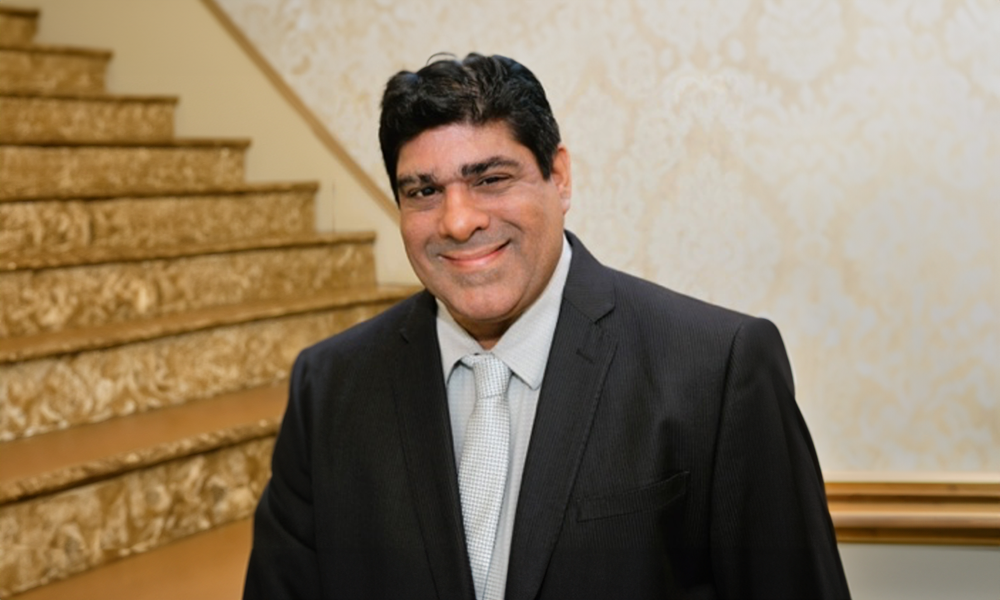
With early voting set to begin in Massachusetts in less than three weeks, Hillary Clinton leads Donald Trump by a margin of 58 percent to 26 percent among likely voters in the latest survey from the Western New England University Polling Institute.
The statewide telephone survey of 403 likely voters, conducted September 24 through October 3, found that even with third party candidates accounting for 11 percent of the vote, Clinton holds a lead in Massachusetts comparable to her husband’s margin of victory here in 1996.
The survey, which has a margin of error of plus or minus five percentage points, showed seven percent of voters backing Libertarian Gary Johnson for president. Four percent of voters said they would support Jill Stein, who is running under the Green-Rainbow Party label in Massachusetts, while another four percent said they were undecided and one percent declined to state a preference. Both third-party candidates have connections to the Bay State. Johnson’s vice-presidential running mate is William Weld, former governor of Massachusetts. Stein lives in Massachusetts and has run for governor here in the past.
Among the larger sample of 467 registered voters, Clinton leads Trump by 29 points in the four-candidate matchup. In a hypothetical match-up between Clinton and Trump without the third-party candidates, Clinton holds a 35-point lead among likely voters, 65 percent to 30 percent. Among all registered voters, Clinton leads Trump by 31 points in a two-candidate race in the latest survey. In previous Polling Institute surveys in April of this year and October 2015, Clinton led Trump by 36 and 37 points respectively among all registered voters in a two-candidate race.
“Although the 2016 presidential campaign has had its share of twists and turns nationally, voter preferences in Massachusetts seem to have been pretty stable over the past year,” said Tim Vercellotti, director of the Polling Institute and a professor of political science at Western New England University.
Democratic presidential nominees have carried Massachusetts by margins of 23 to 26 percentage points in each cycle since 2000. Vercellotti noted that one would have to go back to 1996, when Bill Clinton won the state by 33 points, to find a lead similar to that which Hillary Clinton holds among likely voters in the latest survey.
Hillary Clinton’s sizable lead exists even as Massachusetts voters express clear divisions over her favorability. Forty-eight percent of likely voters hold a favorable view of her, while 44 percent hold an unfavorable view. Among all registered voters Clinton’s favorability rating is under water, with 44 percent viewing her favorably and 48 percent viewing her unfavorably. Her standing among all registered voters has fluctuated only slightly since the last time the Polling Institute polled in the presidential race in April.
Trump, however, is far less popular in Massachusetts. Only 25 percent of likely voters view him favorably, and 70 percent view him unfavorably. Among all registered voters Trump’s favorability is similar, with 24 percent viewing him favorably and 71 percent viewing him unfavorably. Trump’s numbers have improved slightly since the April survey, when only 18 percent of registered voters viewed him favorably, while 75 percent viewed him unfavorably.
Clinton’s lead over Trump in Massachusetts is due in part to a consolidated base, with 88 percent of Democratic likely voters saying they would back her if the election were held today, and only five percent of Democrats indicating a preference for Trump. She also leads Trump by 48 percent to 30 percent among unenrolled voters, who make up more than 50 percent of the electorate in Massachusetts. Clinton receives support from 15 percent of Republican likely voters, while 80 percent of Republicans say they would support Trump.
Clinton also leads among both men and women, although her advantage varies considerably by gender. She leads Trump by 20 points among men, 52 percent to 32 percent, and by 43 points among women, 64 percent to 21 percent. Her margin also varies by education level, with a lead of about 18 points among voters without a college degree, and 41 points among voters who are college graduates.
When asked which candidate they expect will win the presidency, 64 percent of likely voters pointed to Clinton, with 20 percent indicating Trump, 15 percent saying they didn’t know, and one percent declining to offer an opinion. Among Democrats, 80 percent said they expect Clinton to win nationally, while four percent said Trump. Among Republicans, 54 percent predict a Trump victory, and 23 percent expect Clinton to win the presidency.
Enthusiasm for voting in the presidential election also remains high, although enthusiasm is greater among partisans than among unenrolled voters in Massachusetts. Sixty-three percent of Democrats and Republicans say they are extremely or very enthusiastic about voting in the presidential election, while the same is true for 48 percent of unenrolled voters.
Although there is little suspense in the presidential race in Massachusetts this year, the 2016 election is notable for the implementation of early voting for the first time in the state. In the past voters could only vote early if they were going to be away from their city or town on Election Day and they requested an absentee ballot. This year voters can begin to cast ballots on October 24 in Massachusetts, with early voting scheduled to be available until November 4, the Friday before the November 8 general election.
To view the full detailed report click here.
Or paste: www1.wne.edu/news/2016/10/z-press-release-tables3.pdf
METHODOLOGY
The Western New England University Polling Institute conducted a telephone survey Sept. 24 – Oct. 3, 2016. Western New England University sponsored and funded the study. The survey sample consists of telephone interviews in English only with 526 adults ages 18 and older drawn from across Massachusetts using random-digit-dialing. The sample yielded 467 adults who said they are registered to vote in Massachusetts, and 403 voters classified as likely to vote in the Nov. 8, 2016 general election. Voters were classified as likely voters based on their responses to questions about interest in the upcoming election, likelihood of voting in the election, participation in the 2012 election, and knowledge of the location and name of their polling place.
Paid interviewers at the Polling Institute dialed household telephone numbers, known as “landline numbers,” and cell phone numbers using random samples obtained from Survey Sampling International of Shelton, CT. In order to draw a representative sample from the landline numbers, interviewers alternated asking for the youngest adult male or the youngest adult female age 18 or older who was home at the time of the call. Interviewers dialing cell phone numbers interviewed the respondent who answered the cell phone after confirming three things: (1) that the respondent was in a safe setting to complete the survey; (2) that the respondent was an adult age 18 or older; and (3) that the respondent was a resident of Massachusetts. The sample of all adults consisted of 265 interviews completed on landlines and 261 interviews completed on cell phones. The landline and cell phone data were combined and weighted to reflect the adult population of Massachusetts by gender, race, age, and county of residence using U.S. Census estimates for Massachusetts. The data also were weighted to adjust for cell phone and landline usage based on state-level estimates for Massachusetts from the National Center for Health Statistics and to adjust for voter registration by party using figures from the office of the Massachusetts Secretary of the Commonwealth. Complete results of the poll and the full text of the landline and cell phone versions of the survey are available at http://www1.wne.edu/polling-institute/index.cfm.
All surveys are subject to sampling error, which is the expected probable difference between interviewing everyone in a population versus a scientific sampling drawn from that population. The margin of sampling error for a sample of 467 registered voters is +/- 4.5 percent at a 95 percent confidence interval, and the margin of sampling error for a sample of 403 likely voters is +/- 5 percent at a 95 percent confidence interval. Thus if 55 percent of likely voters said they support legalizing the use of marijuana by individuals ages 21 and older in Massachusetts, one would be 95 percent sure that the true figure would be between 50 percent and 60 percent (55 percent +/- 5 percent) had all likely voters in Massachusetts been interviewed, rather than just a sample. Sampling error increases as the sample size decreases, so statements based on various population subgroups are subject to more error than are statements based on the total sample. Sampling error does not take into account other sources of variation inherent in public opinion studies, such as non-response, question wording, or context effects.
Established in 2005, the Western New England University Polling Institute conducts research on issues of importance to Massachusetts and the region. The Institute provides the University’s faculty and students with opportunities to participate in public opinion research. The Institute is a charter member of the Transparency Initiative, sponsored by the American Association for Public Opinion Research. The Transparency Initiative supports greater openness in the reporting of survey research methodology. Additional information about the Polling Institute is available from Dr. Tim Vercellotti, director of the Polling Institute, at polling@wne.edu.





